Current Practices and Future Directions for Treatment of EGFR-Mutated Lung Cancer
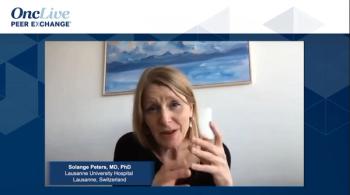
EP. 1: Molecular Testing in Resectable NSCLC
ByNeal Navani, MRCP, MSc, PhD, University College London Hospitals NHS Foundation Trust,Gary Doherty, MRCP, PhD, Cambridge University Hospitals NHS Foundation Trust,Christian Grohe, MD, Evangelical Lung Cancer Hospital,Solange Peters, MD, PhD, Lausanne University Hospital Solange Peters, MD, PhD, reviews factors to consider for molecular testing in early stage non–small cell lung cancer and discusses the role of single-gene assays and next-generation sequencing panels.
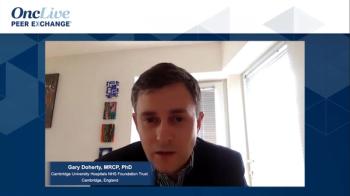
EP. 2: A Multidisciplinary Approach to Reflex Testing in NSCLC
ByNeal Navani, MRCP, MSc, PhD, University College London Hospitals NHS Foundation Trust,Gary Doherty, MRCP, PhD, Cambridge University Hospitals NHS Foundation Trust,Christian Grohe, MD, Evangelical Lung Cancer Hospital,Solange Peters, MD, PhD, Lausanne University Hospital Gary Doherty, MRCP, PhD, and Christian Grohé, MD, discuss the multidisciplinary approach to molecular testing for EGFR mutations in NSCLC and the importance of reflex testing to limit delays in receiving results.
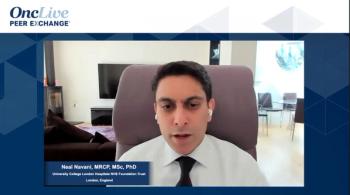
EP. 3: Potential Challenges of Molecular Testing in NSCLC
ByNeal Navani, MRCP, MSc, PhD, University College London Hospitals NHS Foundation Trust,Gary Doherty, MRCP, PhD, Cambridge University Hospitals NHS Foundation Trust,Christian Grohe, MD, Evangelical Lung Cancer Hospital,Solange Peters, MD, PhD, Lausanne University Hospital A panel of experts in the management of lung cancer share key insights into challenges associated with retesting for driver mutations, tumor heterogeneity, and potential differences between biopsy and surgical sample test results.
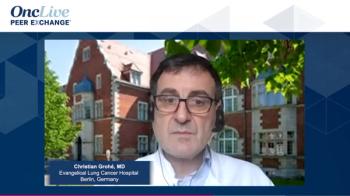
EP. 4: Surgical Resectability in Stage IIIA-N2 NSCLC
ByNeal Navani, MRCP, MSc, PhD, University College London Hospitals NHS Foundation Trust,Gary Doherty, MRCP, PhD, Cambridge University Hospitals NHS Foundation Trust,Christian Grohe, MD, Evangelical Lung Cancer Hospital,Solange Peters, MD, PhD, Lausanne University Hospital Christian Grohé, MD, and Gary Doherty, MRCP, PhD, consider factors that may influence the resectability of patients with stage IIIA-N2 disease, such as biomarker status, performance status, and imaging results.
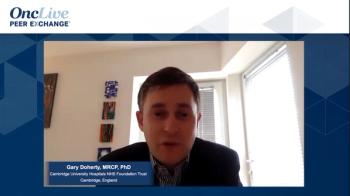
EP. 5: Postoperative Radiotherapy in Resected Stage IIIA-N2 NSCLC
ByNeal Navani, MRCP, MSc, PhD, University College London Hospitals NHS Foundation Trust,Gary Doherty, MRCP, PhD, Cambridge University Hospitals NHS Foundation Trust,Christian Grohe, MD, Evangelical Lung Cancer Hospital,Solange Peters, MD, PhD, Lausanne University Hospital Expert panelists share insights on the results of the LUNG ART trial of postoperative radiotherapy in patients with resected stage IIIA-N2 disease and emphasize the risk for cardiac and pulmonary toxicity.
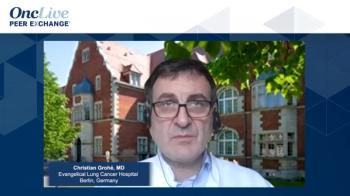
EP. 6: Adjuvant TKIs for Patients With EGFR-Mutated NSCLC
ByNeal Navani, MRCP, MSc, PhD, University College London Hospitals NHS Foundation Trust,Gary Doherty, MRCP, PhD, Cambridge University Hospitals NHS Foundation Trust,Christian Grohe, MD, Evangelical Lung Cancer Hospital,Solange Peters, MD, PhD, Lausanne University Hospital Christian Grohé, MD, comments on results of clinical trials studying EGFR-TKI combination regimens in NSCLC and highlights the need for composite end points that include quality of life and disease control.
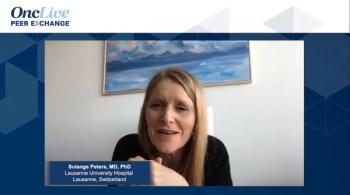
EP. 7: The ADAURA Trial of Adjuvant Osimertinib in NSCLC
ByNeal Navani, MRCP, MSc, PhD, University College London Hospitals NHS Foundation Trust,Gary Doherty, MRCP, PhD, Cambridge University Hospitals NHS Foundation Trust,Christian Grohe, MD, Evangelical Lung Cancer Hospital,Solange Peters, MD, PhD, Lausanne University Hospital Key opinion leader in lung cancer Solange Peters, MD, PhD, reviews safety and efficacy results from the ADAURA trial of adjuvant osimertinib in patients with stage IB-IIIA EGFR-mutated NSCLC following surgical resection.
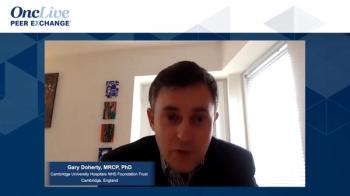
EP. 8: Clinical Implications of the ADAURA Trial
ByNeal Navani, MRCP, MSc, PhD, University College London Hospitals NHS Foundation Trust,Gary Doherty, MRCP, PhD, Cambridge University Hospitals NHS Foundation Trust,Christian Grohe, MD, Evangelical Lung Cancer Hospital,Solange Peters, MD, PhD, Lausanne University Hospital A panel of key opinion leaders in lung cancer considers the clinical implications of the ADAURA trial of adjuvant osimertinib and discuss how results may affect the treatment landscape in early stage NSCLC.
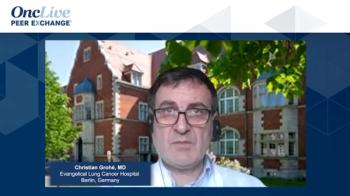
EP. 9: Treatment Approaches After Adjuvant Osimertinib
ByNeal Navani, MRCP, MSc, PhD, University College London Hospitals NHS Foundation Trust,Gary Doherty, MRCP, PhD, Cambridge University Hospitals NHS Foundation Trust,Christian Grohe, MD, Evangelical Lung Cancer Hospital,Solange Peters, MD, PhD, Lausanne University Hospital A panel of thought leaders in the management of NSCLC review best practices for monitoring patients and making treatment decisions after adjuvant osimertinib.

EP. 10: Treatment of Unresectable EGFR-Mutated NSCLC
ByNeal Navani, MRCP, MSc, PhD, University College London Hospitals NHS Foundation Trust,Gary Doherty, MRCP, PhD, Cambridge University Hospitals NHS Foundation Trust,Christian Grohe, MD, Evangelical Lung Cancer Hospital,Solange Peters, MD, PhD, Lausanne University Hospital Key opinion leaders in lung cancer have a lively discussion on the challenges associated with making treatment decisions for patients with unresected stage III EGFR-mutated NSCLC.
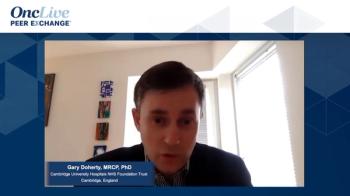
EP. 11: Molecular Testing in Metastatic mNSCLC
ByNeal Navani, MRCP, MSc, PhD, University College London Hospitals NHS Foundation Trust,Gary Doherty, MRCP, PhD, Cambridge University Hospitals NHS Foundation Trust,Christian Grohe, MD, Evangelical Lung Cancer Hospital,Solange Peters, MD, PhD, Lausanne University Hospital Panelists reflect on barriers to obtaining tissue biopsies in patients with EGFR-mutated metastatic NSCLC and share insights into the importance of making treatment decisions based on molecular testing results.
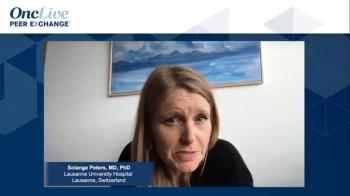
EP. 12: Combination Regimens for Metastatic EGFR-Mutated NSCLC
ByNeal Navani, MRCP, MSc, PhD, University College London Hospitals NHS Foundation Trust,Gary Doherty, MRCP, PhD, Cambridge University Hospitals NHS Foundation Trust,Christian Grohe, MD, Evangelical Lung Cancer Hospital,Solange Peters, MD, PhD, Lausanne University Hospital Expert thought leaders in thoracic oncology share their experiences with EGFR-TKI combination strategies in patients with EGFR-mutated metastatic NSCLC.
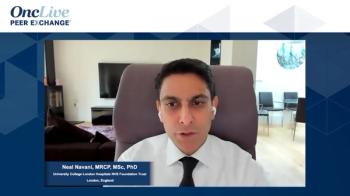
EP. 13: Treatment Algorithms and Resistance Mechanisms in NSCLC
ByNeal Navani, MRCP, MSc, PhD, University College London Hospitals NHS Foundation Trust,Gary Doherty, MRCP, PhD, Cambridge University Hospitals NHS Foundation Trust,Christian Grohe, MD, Evangelical Lung Cancer Hospital,Solange Peters, MD, PhD, Lausanne University Hospital Gary Doherty, MRCP, PhD, Solange Peters, MD, PhD, and Christian Grohé, MD, discuss approaches to selecting or switching treatment based on molecular testing for biomarkers and pathways of resistance.
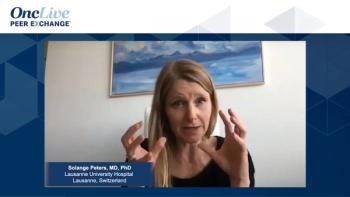
EP. 14: Potential Treatments for Uncommon EGFR Mutations in NSCLC
ByNeal Navani, MRCP, MSc, PhD, University College London Hospitals NHS Foundation Trust,Gary Doherty, MRCP, PhD, Cambridge University Hospitals NHS Foundation Trust,Christian Grohe, MD, Evangelical Lung Cancer Hospital,Solange Peters, MD, PhD, Lausanne University Hospital A key opinion leader in lung cancer, Solange Peters, MD, PhD, provides a review of treatments under investigation for uncommon mutations in NSCLC: mobocertinib, amivantamab, poziotinib, and neratinib.

EP. 15: EGFR+ NSCLC: Advice for Community Oncologists
ByNeal Navani, MRCP, MSc, PhD, University College London Hospitals NHS Foundation Trust,Gary Doherty, MRCP, PhD, Cambridge University Hospitals NHS Foundation Trust,Christian Grohe, MD, Evangelical Lung Cancer Hospital,Solange Peters, MD, PhD, Lausanne University Hospital A panel of experts in thoracic oncology concludes the discussion by emphasizing the importance of conducting reflex molecular testing, considering systemic therapy in all patients, and utilizing shared decision-making models.

















